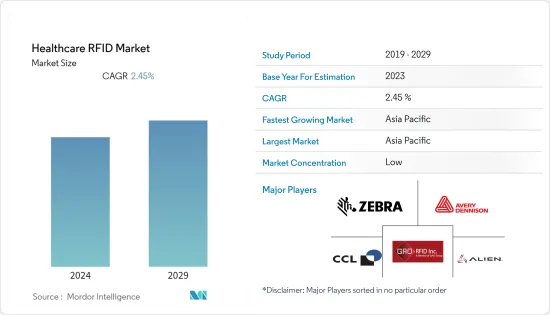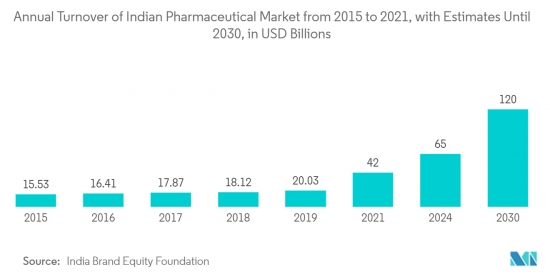 |
市场调查报告书
商品编码
1404394
医疗保健 RFID:市场占有率分析、行业趋势和统计、2024-2029 年成长预测Healthcare RFID - Market Share Analysis, Industry Trends & Statistics, Growth Forecasts 2024 - 2029 |
||||||
※ 本网页内容可能与最新版本有所差异。详细情况请与我们联繫。
本财年医疗保健 RFID 市场估计为 12.3107 亿美元。
预计五年内将达到 13.8945 亿美元,预测期内复合年增长率为 2.45%。

RFID 技术正在对世界各地的医院、诊所、卫生系统、经销商和製造商产生重大影响,并有望在未来几年取得更大的收益。 RFID在医疗领域的采用促使更多的製药公司在药品标籤上贴上RFID标籤来管理其供应链。因此,RFID的采用可能会继续在医疗领域发挥更重要的作用。
主要亮点
- 几十年来,跨国製药公司一直在世界各地生产和销售药品。然而,标籤是一项严格而艰鉅的挑战,而且其复杂性只会越来越大。新的标籤法规因国家和地区而异,预计将显着刺激 RFID 市场的成长,迫使製药公司要么建立满足全球需求的系统,要么聘请专家来这样做。
- 将 RFID 融入药品将使整个供应链的药品管理和认证更加准确,旨在将错误消除到接近零,从而提高患者的安全。此外,它还消除了昂贵且更重要的是集中的医院内药物标籤的需要,从而减轻了医院工作人员的重大负担。
- RFID还可应用于医院和药房的库存管理,确保品质并消除浪费。其好处超出了投资回报,因为 RFID 具有拯救生命的潜力。这就是为什么行业参与者正在组装产品系列,其中包括防篡改 RFID 标籤和发光标籤,以便为药房、医院和患者提供关键资讯。这些智慧 RFID 解决方案有助于降低成本、提高准确性并加快业务速度,同时保护製药品牌免于仿冒。
- 阻碍市场发展的因素包括医疗保健 RFID 系统的高实施成本和系统互通性。采用 RFID 的行业必须在操作读取器、标籤、软体、电力和交换服务方面进行大量投资。物联网组件整合、系统可靠性测试和培训成本等附加功能增加了 RFID 解决方案的成本。
- 在 COVID-19 大流行期间,医院正在使用 RFID 技术更好地管理患者和工作人员。医疗产业在采用 RFID 设备方面取得了重大进展,RFID 设备使用无线电波来识别和追踪资产和设备。当医疗团队继续面临突发公共卫生事件时,RFID 可能会提高他们的效率和课责。
医疗保健 RFID 市场趋势
检查生长的药物
- 随着製造商越来越多地支援具有 RF 标籤识别功能的智慧标籤,并且药品与其他製药技术解决方案的互通性越来越强,越来越多的医院和医疗保健系统开始采用RFID 标籤进行设施内药品追踪。
- 然而,製药业也采用 RFID 来防止各种处方笺药的假冒,从而增加了供应链和业务效益。由于技术不断进步,製造商可以利用资料分析技术和RFID技术来准确分析消耗和库存资料。加州药房委员会强制要求在供应链中实施 e-Pedigree 等监管要求也将为製药业带来对 RFID 的巨大需求。
- 医疗 RFID 市场受到製药业日益严格的法规环境的显着推动。在製药业,各国政府和其他监管机构采取了严格措施,以减少仿冒品和其他健康问题造成的问题。
- 一旦处方笺进入药柜,製药公司就会寻求改进的方法来管理整个供应链的药品。由于其资料采集和传输能力,RFID目前被视为这一问题的答案。製药业寻求透过提高品质、降低成本、最重要的是提高病患安全来实现这一目标。

亚太地区成长迅速
- RFID在医疗领域有着广泛的应用,包括对病患和医疗设备的持续和直接追踪。 RFID 帮助医疗保健专业人员提高和加快护理质量,减少医疗错误,并消除大量资料收集、完整性、输入和验证,包括患者识别、药物检查和患者转诊。工作。
- 对该地区市场成长产生积极影响的关键因素是医疗保健成本的上升和医疗保健基础设施的改善。促进区域发展的成长要素,例如医院附属医疗保健人员数量的增加、法规结构的改进、患者安全的优先考虑以及医疗设备的跟踪,由于疾病负担的增加而增加了对高效医疗保健服务的需求。 .预计促进
- 此外,资产追踪 RFID 解决方案的使用正在澳洲不断扩大。医院和养老机构必须处理大量一次性物品,例如绷带、针头和个人防护装备。被动 RFID 标籤可贴在装有消耗品和一次性物品的盒子上。
- 然而,RFID技术广泛应用于医疗产业,例如医疗设备、机械和支援设备。医疗 RFID 市场的成长是由于越来越多地使用 RFID 来监控各种医疗保健环境中的这些设备,以提供高效的患者照护。
医疗保健 RFID 产业概述
医疗保健 RFID 市场主要由多个地区和国际参与企业组成,使其成为一个竞争相当激烈的市场。此外,公司也透过技术进步获得持续的竞争。物联网和云端运算等技术正在改变市场开拓。总体而言,供应商之间的竞争在整个期间都非常激烈,并且预计将持续下去。该市场的主要企业包括 Alien Technology Corporation、Zebra Technologies Corporation、CCL Industries Inc.、Avery Dennison Corporation 和 Biolog-id GAO RFID, Inc.。
2023年6月,Ascom和德国Niels-Stensen-Kliniken集团将实施Ascom的创新警报系统解决方案和IP-DECT基础设施,实现医疗基础设施的数位化,优化总体成本,同时增加我们宣布已签订合约协议,这将使我们能够确保高效、优质的患者照护。
2023 年 3 月,Zebra Technologies Corporation 宣布 Alpro Pharmacy 实施了 Zebra 的行动运算和 RFID 解决方案,以实现其手动库存管理系统的数位化并为其快速成长的业务提供动力。数位化的阶段是为 Alpro Pharmacy 的第一线员工配备 Zebra 的 TC21 触控计算机,取代手动纸笔库存管理系统。部署行动装置来协助完成所有库存管理业务,从在 Alpro Pharmacy 配送中心接收产品到为零售和电子商务订单挑选产品。该解决方案将 Alpro Pharmacy 的效率提高了约 80%,并透过减少人为错误提高了准确性。
其他福利:
- Excel 格式的市场预测 (ME) 表
- 3 个月的分析师支持
目录
第一章简介
- 研究假设和市场定义
- 调查范围
第二章调查方法
第三章执行摘要
第四章市场洞察
- 市场概况
- 产业价值链分析
- 产业吸引力-波特五力分析
- 供应商的议价能力
- 买家/消费者的议价能力
- 新进入者的威胁
- 替代品的威胁
- 竞争公司之间敌对关係的强度
- 评估 COVID-19 对产业的影响
第五章市场动态
- 市场驱动因素
- 製药业对药品标籤的监管收紧
- 增加 RFID 设备在医疗领域的应用与使用
- 市场抑制因素
- 开发替代标籤方法
第六章市场区隔
- 副产品
- 标籤和标籤
- 射频识别系统
- 资产监控系统
- 病患监测系统
- 药品监控系统
- 血液监测系统
- 按最终用户
- 医院
- 製药公司
- 其他最终使用者(研究所、实验室)
- 按地区
- 北美洲
- 美国
- 加拿大
- 墨西哥
- 欧洲
- 德国
- 英国
- 法国
- 义大利
- 西班牙
- 欧洲其他地区
- 亚太地区
- 中国
- 日本
- 印度
- 澳洲
- 韩国
- 其他亚太地区
- 南美洲
- 中东/非洲
- 北美洲
第七章竞争形势
- 公司简介
- Zebra Technologies Corporation
- Avery Dennison Corporation
- CCL Industries Inc.
- Alien Technology Corporation
- GAO RFID, Inc
- Honeywell International Inc.
- S3Edge Inc.
- STANLEY Healthcare
- Biolog-id
- Impinj Inc.
- Mobile Aspects Inc.
- RF Technologies
- STid Groupe
- Terso Solutions Inc.
- Spacecode Technologies
第八章投资分析
第9章市场的未来

The RFID Market in Healthcare was estimated at USD 1,231.07 million in the current year. The market is expected to reach USD 1,389.45 million in five years, registering a CAGR of 2.45% during the forecast period.
RFID technology has significantly impacted hospitals, clinics, healthcare systems, distributors, and manufacturers worldwide but is due to achieve even more in years to come. The adoption of RFID in the medical field has become a catalyst for more and more pharmaceutical companies to put RFID tags on medicine labels to control their supply chain. The adoption of RFID will thus continue to have a more vital role in the healthcare sector.
Key Highlights
- Multinational pharmaceutical companies have been manufacturing medicines for decades to distribute worldwide. Labelling, however, is a rigorous and challenging task that continues to grow more complex. With new labeling regulations that can vary widely across the country and region, which are predicted To stimulate growth in the RFID market by a large margin, pharmaceutical companies must either build their systems to meet global needs or delegate them to experts to be able to do so.
- Integrating RFID in pharmaceutical products will help increase patient safety because it allows for more precise control and authentication of medicinal products throughout the supply chain, aiming to reduce errors to almost zero. In addition, it eliminates the need for costly and, more importantly, labor-intensive in-house medication labeling, thereby relieving a significant burden on hospital staff.
- RFID may be applied for inventory management at hospitals and pharmacies to ensure quality and reduce waste. The benefits go beyond the return on investment since it has the potential to save lives. That is why, to provide pharmacies, hospitals, and patients with critical information, industry players are putting together a premium product portfolio that includes tamper-evident RFID tags and luminous labels; these smart RFID solutions will help to reduce costs, raise accuracy, and speed up operations while protecting pharmaceutical brands from counterfeiting.
- A few factors slowing down the market studied include high installation costs for RFID systems in healthcare and system interoperability. Any industry adopting RFID must invest significantly in readers, tags, software, electricity, and operating replacement services. Additional features such as integration of Internet of Things components, system reliability testing, and training costs add to the cost of an RFID solution.
- Hospitals use RFID technology to manage patients and staff better during pandemics due to the COVID-19 outbreak. The healthcare industry has seen a great uptake of RFID devices, which use radio waves to identify and track assets and equipment. RFID will increase the efficiency and accountability of healthcare teams as we continue to face a Public Health Emergency.
RFID in Healthcare Market Trends
Pharmaceuticals to Witness the Growth
- More hospitals and healthcare systems are beginning to adopt RFID tags for tracking medication inside their facilities as manufacturer-enabled smart labels with RF tag identification increases, in addition to more interoperability between medications and other pharmacy technology solutions.
- However, RFID has also been adopted by the pharmaceutical industry to prevent the counterfeiting of different prescription medicines with added supply chains and operational benefits. As a result of continued technological advancement, manufacturers can accurately analyze consumption and inventory data using data analysis techniques and RFID technology. As mandated by the California Board of Pharmacy, regulatory demands such as implementing e-Pedigree in the supply chain will also generate substantial demand for RFID in the pharmaceutical sector.
- The healthcare RFID market has been significantly driven by an increasingly strict regulatory environment in the pharmaceuticals sector. In the field of pharmaceuticals, stringent measures have been introduced by governments and other regulatory bodies throughout different countries to reduce problems caused by counterfeits and other health issues.
- Once a prescription has been put in the medicine cabinet, pharmaceutical companies look for improved ways of controlling their medicines throughout the supply chain. RFID is currently regarded as the answer to this question due to its capacity for capturing and transmitting data. The pharmaceutical industry tries to achieve that by improving quality, reducing costs, or, most of all, enhancing patient safety.

Asia Pacific to Register Fastest Growth
- RFID is applied to a wide range of applications in the healthcare sector, such as constant and direct patient or medical device tracking. It helps and supports healthcare professionals to improve and promote healthcare quality, decreases medical errors, and optimizes and automates the healthcare process by carrying out large amounts of work in data collection, integrity, entry, and confirmation such as patient identification, pharmaceuticals checks, and patient referrals, among others.
- The main factors positively influencing growth in the region's market are rising medical costs and improved healthcare infrastructure. Growth factors contributing to regional development, including the increasing number of healthcare professionals associated with hospitals, improved regulatory framework, prioritizing patient safety, and tracking medical devices, are expected to drive demand for efficient health services due to the rising disease burden.
- In addition, the use of RFID solutions to track assets is widespread in Australia. Large quantities of disposable goods like bandages, needles, and personal protection equipment must be handled by hospitals and elderly care facilities. Box containing consumables and disposable items may be fitted with passive RFID tags.
- However, RFID technology has been extensively used in the healthcare industry, for instance, in medicine devices, machinery, and support equipment. The growth of the healthcare RFID market is fueled by the increasing use of RFID to monitor these devices in different health environments to provide efficient patient care.
RFID in Healthcare Industry Overview
The RFID market in healthcare primarily comprises multiple regional and international players in a fairly contested market space. Furthermore, firms gain a sustained competitive edge due to technological progress. Technologies like the Internet of Things and cloud computing are altering market developments. Overall, it is anticipated that the intensity of competitive competition between vendors will be high throughout the period under review and continue to do so. Some key players in the market are Alien Technology Corporation, Zebra Technologies Corporation, CCL Industries Inc., Avery Dennison Corporation, and Biolog-id GAO RFID, Inc., among others.
In June 2023, Ascom announced a contract agreement with Niels-Stensen-Kliniken Group in Germany with the installation of the Ascom innovative alarming system solution and IP-DECT infrastructure and Digitization of the healthcare infrastructure, making it possible to ensure more efficient and better patient care while optimizing overall costs.
In March 2023, Zebra Technologies Corporation announced that Alpro Pharmacy had introduced Zebra's mobile computing and RFID solutions to digitalize its manual inventory management system to advance its fast-growing business. The first stage of digitalization was to equip Alpro Pharmacy's front-line workers with Zebra's TC21 touch computers to replace their manual inventory management system using pen and paper. The mobile devices were introduced to assist with all inventory management tasks, from receiving goods at Alpro Pharmacy's distribution center to picking goods for its retail stores and e-commerce orders, to name a few. The solution has since enhanced Alpro Pharmacy's efficiency by approximately 80% and improved its accuracy by reducing human errors.
Additional Benefits:
- The market estimate (ME) sheet in Excel format
- 3 months of analyst support
TABLE OF CONTENTS
1 INTRODUCTION
- 1.1 Study Assumptions and Market Definition
- 1.2 Scope of the Study
2 RESEARCH METHODOLOGY
3 EXECUTIVE SUMMARY
4 MARKET INSIGHTS
- 4.1 Market Overview
- 4.2 Industry Value Chain Analysis
- 4.3 Industry Attractiveness - Porter's Five Forces Analysis
- 4.3.1 Bargaining Power of Suppliers
- 4.3.2 Bargaining Power of Buyers/Consumers
- 4.3.3 Threat of New Entrants
- 4.3.4 Threat of Substitute Products
- 4.3.5 Intensity of Competitive Rivalry
- 4.4 Assessment of the Impact of COVID-19 on the Industry
5 MARKET DYNAMICS
- 5.1 Market Drivers
- 5.1.1 Growing Stringency in the Pharmaceutical Sector with Regards to Medicine Labeling
- 5.1.2 Increased Applications and Use of Devices Supporting RFID Across the Healthcare Sector
- 5.2 Market Restraints
- 5.2.1 Development of Alternate Labeling Methods
6 MARKET SEGMENTATION
- 6.1 By Product
- 6.1.1 Tags and Labels
- 6.1.2 RFID Systems
- 6.1.2.1 Asset Tracking Systems
- 6.1.2.2 Patient Tracking Systems
- 6.1.2.3 Pharmaceutical Tracking Systems
- 6.1.2.4 Blood Monitoring Systems
- 6.2 By End User
- 6.2.1 Hospitals
- 6.2.2 Pharmaceuticals
- 6.2.3 Other End Users (Research Institutes and Laboratories)
- 6.3 By Geography
- 6.3.1 North America
- 6.3.1.1 United States
- 6.3.1.2 Canada
- 6.3.1.3 Mexico
- 6.3.2 Europe
- 6.3.2.1 Germany
- 6.3.2.2 United Kingdom
- 6.3.2.3 France
- 6.3.2.4 Italy
- 6.3.2.5 Spain
- 6.3.2.6 Rest of Europe
- 6.3.3 Asia Pacific
- 6.3.3.1 China
- 6.3.3.2 Japan
- 6.3.3.3 India
- 6.3.3.4 Australia
- 6.3.3.5 South Korea
- 6.3.3.6 Rest of Asia Pacific
- 6.3.4 South America
- 6.3.5 Middle East & Africa
- 6.3.1 North America
7 COMPETITIVE LANDSCAPE
- 7.1 Company Profiles
- 7.1.1 Zebra Technologies Corporation
- 7.1.2 Avery Dennison Corporation
- 7.1.3 CCL Industries Inc.
- 7.1.4 Alien Technology Corporation
- 7.1.5 GAO RFID, Inc
- 7.1.6 Honeywell International Inc.
- 7.1.7 S3Edge Inc.
- 7.1.8 STANLEY Healthcare
- 7.1.9 Biolog-id
- 7.1.10 Impinj Inc.
- 7.1.11 Mobile Aspects Inc.
- 7.1.12 RF Technologies
- 7.1.13 STid Groupe
- 7.1.14 Terso Solutions Inc.
- 7.1.15 Spacecode Technologies













